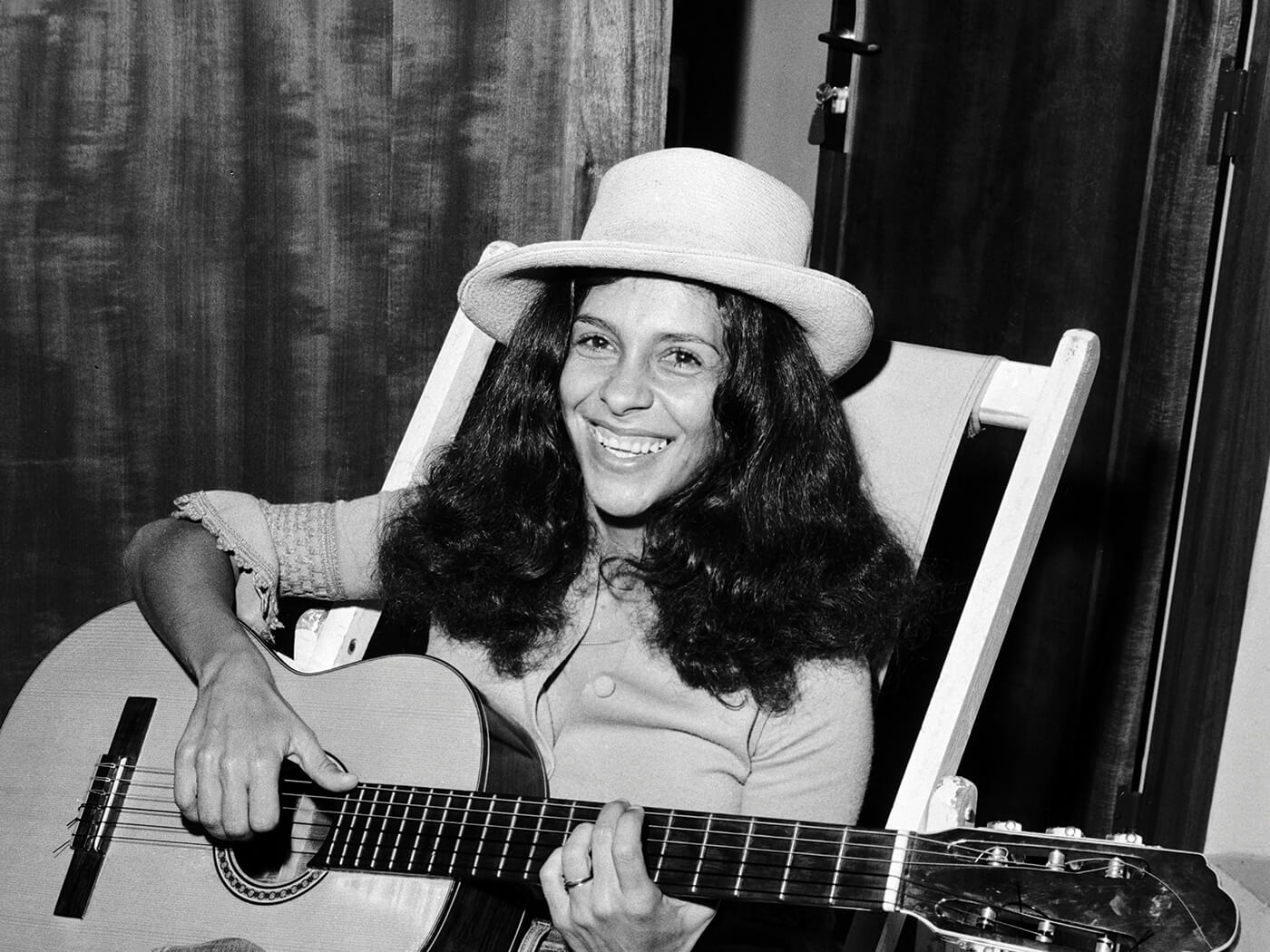In the mid-’70s, in opposition to the repressive fist of the military junta, the Brazilian counterculture flourished, finding their métier in resistance through dropping out and turning on. The return of two exiled musicians and legends, Gilberto Gil and Caetano Veloso, had something to do with it; Veloso’s long hair and feyness was a defiant finger to conservative sensibilities, for example. But there was more going on here, with ragtag assemblages of ‘curtição’ and ‘desbunde’ (trip-outs and dropouts), artists, filmmakers and musicians, all gathering to get free on the beaches of Ipanema, a neighbourhood in Rio de Janeiro.
The figurehead for all this activity was Tropicálista singer and icon, the late Gal Costa. With her air of insouciant cool and her history as a popular avant-gardist and provocateur, she was in the right place at the right time, and her status was assured when the local countercultural mavens named a stretch of the beach dunes of Ipanema ‘Monte da Gal’ in tribute. “Gal was the queen of this scene,” Veloso wrote in his autobiography, Tropical Truth, describing the “slip of beach” that Costa frequented as “an area where a pile of sand had been dredged up from the bottom of the ocean for the construction of a ‘submarine emissary’.”
It all paints a picture of a roughshod idyll under pressure, the ‘desbunde’ blowing off the broader oppressions of Brazilian culture. Within that climate, Costa – whose music merged Brazilian popular music with rock, psychedelia and electronics – recorded Índia, one of her greatest albums. A hymn and testament to the liberatory powers of popular music, its reflections on Brazilian society and politics were coded and cloaked in the gorgeous melancholy and rutting grooves of these nine songs, whose melodies soared thanks to one of the singer’s most compelling performances.
Costa was not one for understatement, as the cover images of Índia attest, the upfront sensuality of the front cover’s bikini shot balanced out by a back cover where Costa posed, near-naked, in an indigenous Brazilian outfit. Unsurprisingly, it drew the attention and ire of the military leadership, who censored the sleeve. The content of the album was no less unflinching, though with the help of arranger Arthur Verocai and musical director Gilberto Gil, Costa formulated a sound that embraced the experimentation of her earlier albums but framed this within a more ‘naturalistic’ setting.
Costa’s song choices throughout Índia are instructive, with her preternatural ear for a great, appropriate melody allowing everything here to sit beautifully within her range. The opening title track, written by José Asunción Flores and Manuel Ortiz Guerrero, a composer and poet, respectively, from neighbouring country Paraguay, is unabashedly lush. A truly great writer, Flores is widely recognised as the inventor of the Guarania genre, a music centred around the Paraguayan harp, its unique sound mobilised to help tell the stories of the Paraguayan people.
Costa’s interpretation of Flores’ song builds from a version with lyrics by Brazilian singer and actor José Fortuna. Building in intensity through its five minutes, “Índia” has Costa catching the arc of Flores’s melodic developments beautifully, the orchestral arrangement full of drama, stippling each verse with lush texture, while brass and flute punctuate throughout. It’s a complex, dazzling arrangement, and Costa pulls off the yearning in the melody perfectly.
The beating heart of Índia, though, is two songs by Veloso. “Relance” (“Glance”) is one of the most startling grooves here, Dominghuinhos’s accordion huffing a repeating, see-sawing phrase through the entire song, the bass and guitar colouring the song unexpectedly, as an incessant rhythm ploughs through; Costa’s abrupt chants and squeals deliver the declamatory lyrics with ferocity. “Da Maior Importãncia” (“Of Major Importance”) is stripped back, a sly, halting guitar motif circling through the song as Costa sings bewitchingly – it’s reminiscent, a little, of the deconstructed songs of fellow Tropicálista Tom Zé.
Every song here has the capacity to startle, from the blasted percussion and voice that pockmark Portuguese folk song “Milho Verde” (“Green Corn”), to the jazz-infused piano-and-voice duo on samba composer Lupicínio Rodrigues’s “Volta” (“Return”). “Passarinho” (“Bird”), written by Tuzé De Abreu, whose 2018 album Contraduzindo is a late-period masterpiece, feels almost Cubist in design, at first, with its jutting, fragmented riff, though this resolves to some of Toninho Horta’s most sensitive guitar-playing, while Costa carries the song’s sleek melody with sensuality, the corners of the notes blurring together as they slip from her mouth.
At first glance, Costa’s run of albums across the ’70s have her walking a tightrope between countercultural exploration and respect for tradition. Perhaps that’s too simplistic a reading of what’s going on in this multi-faceted, fascinating music, though. One thing Costa seemed to share with the likes of Veloso was a constant desire to unearth the radical potential of music that may have settled into complacent conservatism. It’s no surprise, then, that Costa signs off Índia with Antonio Carlos Jobim’s bossa nova standard “Desafinado” (“Off-Key”). It’s a knowing way to wrap up an album that reinvigorates the many pasts of Brazilian song by letting it all hang out.

